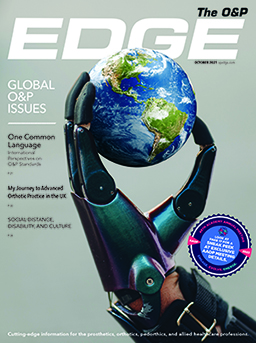Making Late Entries, Addendums, and Corrections to the Medical Record Showcase
 Medicare coverage guidelines dictate that physician notes are required for corroboration of medical necessity, and this documentation must be available to the DME MAC upon request. It is strongly recommended that O&P practices use proactive strategies to educate your referral sources about the requirements outlined in Medicare's policies to ensure the notes you receive are accurate and relevant.
Medicare coverage guidelines dictate that physician notes are required for corroboration of medical necessity, and this documentation must be available to the DME MAC upon request. It is strongly recommended that O&P practices use proactive strategies to educate your referral sources about the requirements outlined in Medicare's policies to ensure the notes you receive are accurate and relevant.
Proactive Strategies
• Create a Medicare assessment tool that specifies what documentation Medicare requires to consider an orthosis or prosthesis reasonable and necessary, and provide it to your referring physicians. This tool is also helpful to orthotists and prosthetists as they prepare their documentation.
• Have a scrubbing protocol to review documentation prior to claim submission to assure that when addendums are necessary they will be acceptable. For example, if documentation is missing or does not support the device, an addendum should be requested from the physician. A valid addendum must be received before the claim is submitted.
• When a physician's corroborating notes are unsatisfactory and requests for additional information fail to deliver the required documentation, the patient can be referred to a local physiatrist who is familiar with Medicare requirements.
However, what happens when the proactive approach does not work? While the need for corrections to medical records should be avoided whenever possible, it cannot always be avoided.
When a deficiency is discovered in the notes, it is common practice to create a late entry or an addendum or make a minor change to the medical record. It is important to know how to correctly make the changes, but first, it is important to know the difference between a late entry and an addendum:
A late entry is made to the medical record when information that was absent from the original entry is recorded after the original note was created, dated, and signed.
An addendum to a medical record provides additional information that was not available at the time of the original entry. Addendums made after the claim is submitted will not be considered when Medicare reviews the medical record.
Medicare's policy on late entries and addendums can be found in the Program Integrity Manual; Chapter 3, §3.3.2.5:
Corrections to the medical record prior to the claims submission and/or medical review will be considered in determining the validity of the services billed.
If changes appear in the record following the payment determination based on medical review, only the original record will be reviewed in determining the payment of services billed.
When amending the medical record, the following guidelines should be followed:
• Clearly identify whether the entry is a late entry or an addendum.
• Enter the additional information as additional information. Do not make it appear that the information you are adding was part of the original document.
• Enter the date of the late entry or addendum.
• The late entry or addendum must be signed.
• Identify the original content.
• Make sure the late entry or addendum does not override the original entry.
• If you were not the author of the original entry, note that you confirmed the late entry or addendum with the original author.
• Note the justification for the modification.
Late entries, addendums, or corrections should never be common occurrences, as they could be seen by Medicare as evidence of inadequate practices, so it is important to review your documentation for accuracy and ensure correct and complete information is entered.
Best practice should always be to take proactive approaches to obtain compliant medical records, but when noncompliant records are received, it's important to have guidelines for treating late entries, addendums, and corrections to avoid unnecessary losses.
While every attempt has been made to ensure accuracy, The O&P EDGE is not responsible for errors.
Erin Cammarata is president and owner of CBS Medical Billing and Consulting. She can be contacted at erin@cbsmedicalbilling.com.






-
-
-
-
CONTACT US